Melasma
Your journey to smoother, melasma-free skin starts here.
Overview
Melasma is a pretty common skin condition that leads to brown spots and patches on the skin, particularly on the face. Women are primarily affected, especially those who are pregnant or using hormonal contraceptives. Melasma is not harmful, but it is a significant cosmetic concern. Managing it effectively requires that you understand its causes, signs, and available melasma treatment options.
| Downtime | Avg Cost Of Treatment | No. Of Sessions Required | Success Rate | No. Of Patients Treated |
|---|---|---|---|---|
| Max 5 Days | Depends On Treatment | 4-6 Sessions | 60% | 50,000+ |
Many Treatments. One Goal.
Personalised Treatment. Best Results
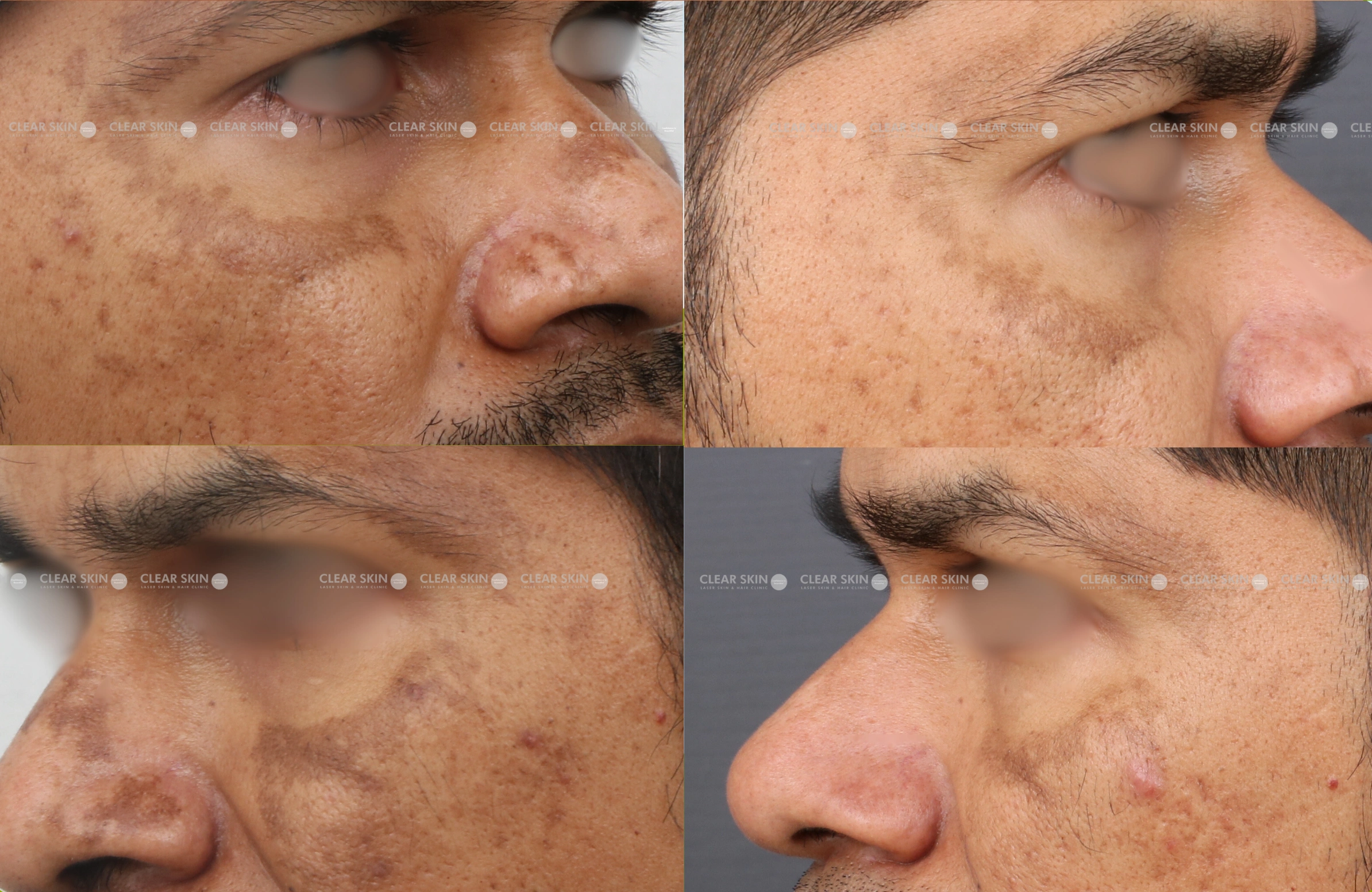
A male patient was experiencing melasma spots on his face.
Conditions
Melasma
Treatment
Chemical Peel, Laser Therapy, Electroporation, Microdermabrasion, Topical Medication
Duration
10 Months, 9 Sessions (settings)
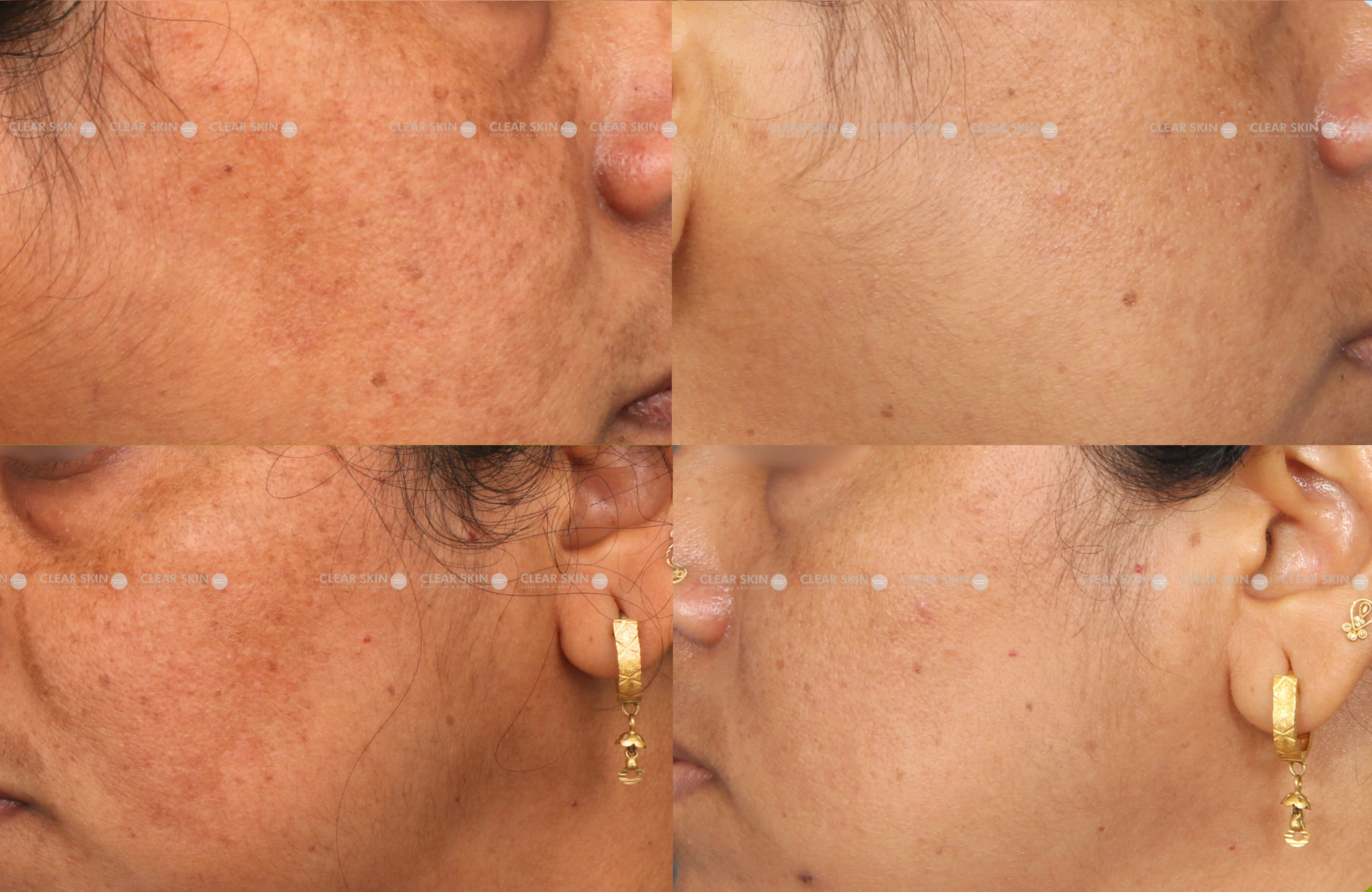
A Female patient suffered from facial melasma spots
Conditions
Melasma
Treatment
Chemical Peel, Laser Therapy, Microdermabrasion, Topical Medication
Duration
5 Months, 4 Sessions (settings)
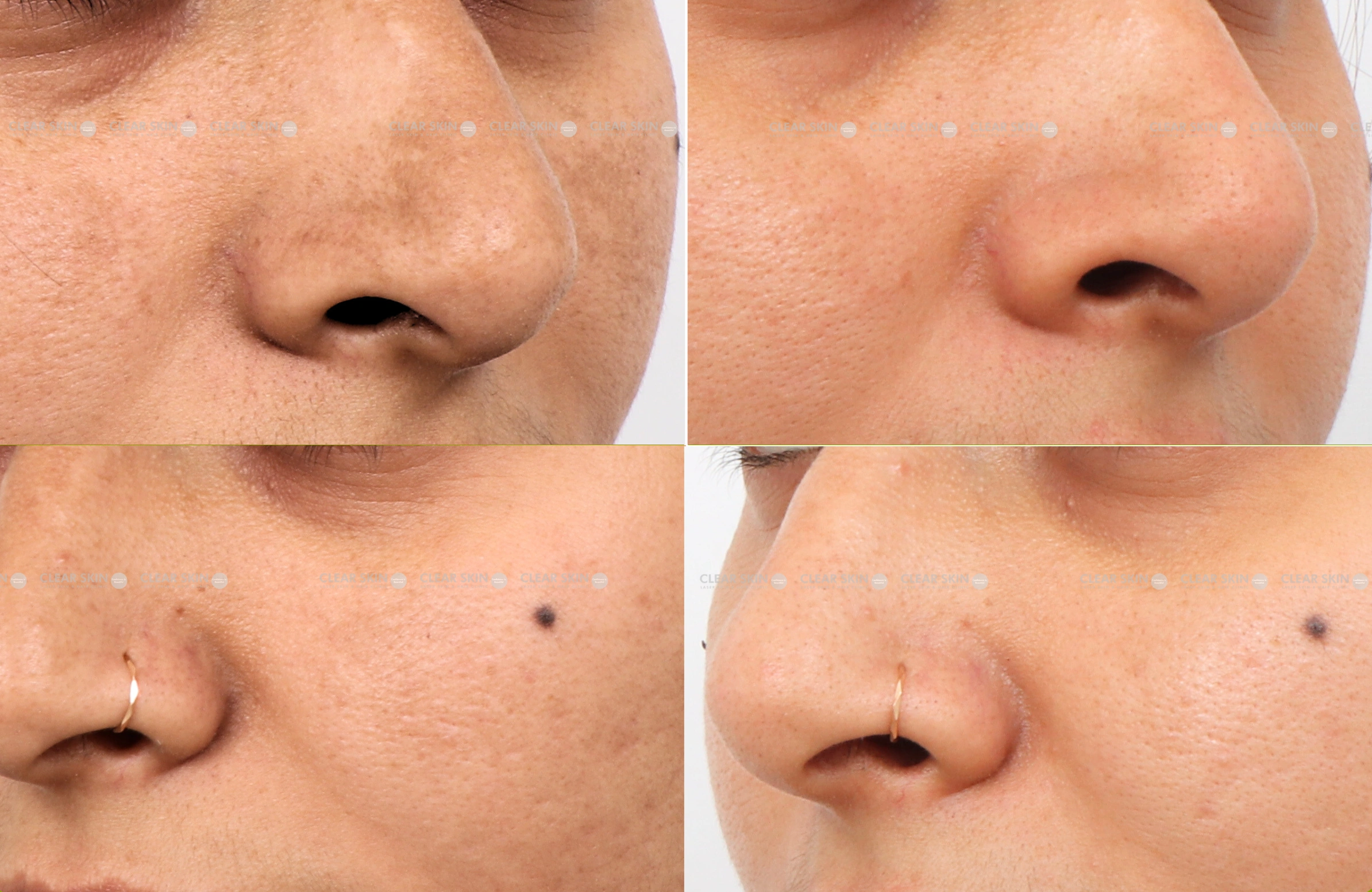
A Female patient, losing confidence, was affected by melasma spots on his face.
Conditions
Melasma
Treatment
Chemical Peel, Laser Therapy, Electroporation, Microdermabrasion
Duration
5 Months, 4 Sessions (settings)
With Our Proprietary Treatment Approach, We Have Treated 50000+ Patients Successfully.
Be one of them!
Many Treatments. One Goal.
Yes, It Is Possible To Get Melasma Free Skin.
50,000+ Successfully Treated Melasma Patients Over 34+ years
(You are one click away from flawless skin)
All You Need To Know About Melasma
The other primary cause of melasma is altered hormone balance. Melasma is often seen in women during or post pregnancy or with hormonal contraceptives and post menopausal, showing a significant hormonal influence in its cause. The hormones that play a role are your estrogen, progesterone and thyroid hormone which can trigger melasma in sensitive persons. Lastly, most of the time, the underlying factor is finally genetics, which can significantly influence the development of melasma and pigmentation. Genetics determine how the skin cells process the triggers and cause melasma. Therefore chances of developing melasma increase in people whose family members already suffer from it.
Sun Exposure

Hormonal Changes

Genetic Predisposition
Brown patches on skin, especially on the face, are the most common symptom of melasma. These patches can appear on the forehead, cheeks, nose, and upper lip in a butterfly pattern. They can vary from light brown to brown-grey in colour. Melasma symptoms tend to worsen with sun exposure. Even brief periods in the sun can darken the patches and spread them further. This sensitivity to sunlight necessitates diligent use of sun protection measures, such as broad-spectrum sunscreen and hats.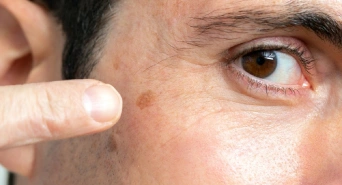
Brown Patches on Skin

Symmetrical Pattern

Worsening with Sun Exposure
Treating melasma is usually done using topical medicines. This is one most common cure for melasma. Topical creams using depigmenting agents like hydroquinone are prescribed to stop and slow down melanin production in the affected area. It can be often coupled with creams to cause exfoliation and rapid removal of pigment to lighten the patches. Topical creams may cause worsening if misused and thus proper guidance from a dermatologist is recommended for any melasma treatment. Chemical peels offer a good solution for treating melasma. They treat melasma by removing the upper superficial layers of the skin and promoting new skin formation. This effectively removes the pigment in the skin cells which are replaced by new healthy skin cells. Glycolic Acid Peel and Trichloroacetic Acid (TCA) Peel are the most common treatments for melasma. Newer melasma treatment options include taking oral tranexamic acid tablets. It decreases or stops the production of melanin, which causes pigmentation to lighten. When used jointly with topical applications, they are even more effective in managing melasma.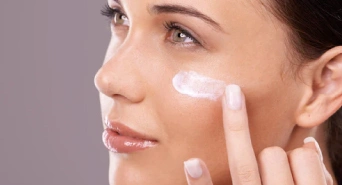
Topical Treatments

Chemical Peels

Oral Medications
The Q-Switched NdYAG laser is a widely used laser treatment for melasma because it specifically deals with only melanin while not affecting nearby skin. Multiple sessions are required for effective results. Newer technologies like pico Q switched NdYAG are now available for more superior results. The long pulse NdYAG laser works to reduce the vascular component in melasma patches, and thus help to lighten them. It is often coupled with Q switched Nd YAG for better results. Ensure you learn about the melasma laser treatment cost in Pune before proceeding.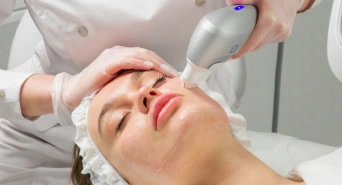
Q-Switched Nd YAG Laser
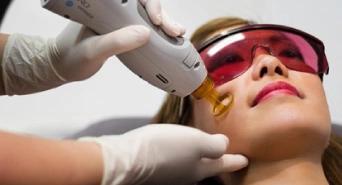
Long Pulse Laser
If new patches appear or existing ones worsen despite treatment, consult the best dermatologists in Pune. They can provide a comprehensive evaluation and adjust your treatment plan to address your condition better. When melasma takes a toll on your self-confidence and quality of life, going for professional assistance is necessary. Choose a clinic that offers advanced treatment options by renowned dermatologists.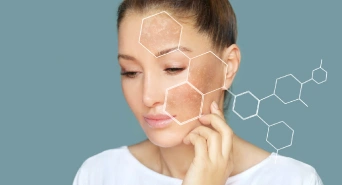
Persistent Brown Patches on Skin

New or Worsening Symptoms

Impact on Quality of Life
Many Treatments. One Goal.
Our Patients Living Confidently Everyday.
I visit this place for my acne problem and I got excellent result. Dr Sumit is very humbal and kind and give me very effective treatment and all staff is very friendly.
I was going through acne since long...found clear skin hair md and got fantastic result for my acne best clinic for acne prone skin...thank you. Me highly recommend for people who are going through acne 🙂
Professional Acne solutions for all the skin types are available here. Big thanks to Kishori ma’am for helping me out with all my skin related issues, highly recommended.
Clear Skin clinic is rated excellent on google & practo
(4.9 out of 5 based on 8289 google & 8000+ practo reviews )
Many Treatments. One Goal.
Clear Skin. We Care.
WE ARE THE MOST PREFERRED SKIN CLINIC FOR Treating Melasma IN PUNE! WHY?
Clear Skin Clinic Services stands out as the most recommended clinic for melasma treatment in Pune due to our experienced team of specialized dermatologists and cutting-edge technologies. We offer personalized treatment plans that cater to individual skin types, ensuring effective and safe results. Our comprehensive approach includes the best laser treatment for melasma in Pune, providing our patients with the ultimate care possible. At Clearskin Clinic, patient satisfaction is our top priority, and our commitment to delivering visible results makes us the reliable choice for those seeking the best cure for melasma. Experience the difference with Clearskin Clinic and achieve radiant, even-toned skin.
We
Dermatology services in Pune using effective and state-of-the-art technologies and equipment.
Provides personalised melasma treatment plans and guidance to each patient following a thorough assessment and profiling of their condition.
Actively involved in dermatological research and continually updated with the latest education on Melasma Treatment.
Others
We Are Committed Not Only To Treating You,
But Also Educating You.
One Of The
Largest Youtube
Channel
On Skin Care
Follow us to learn the best & authentic know-hows of skin treatments from veteran dermatologist in Maharashtra
Be The Part Of 1,175,644+ Family
Visit Our Channel
Does Kojic acid works for Melasma? | Clear Skin, Pune
Melasma During Pregnancy | Clear Skin, Pune
How To Treat Melasma? | Clear Skin, Pune
Patient Guides
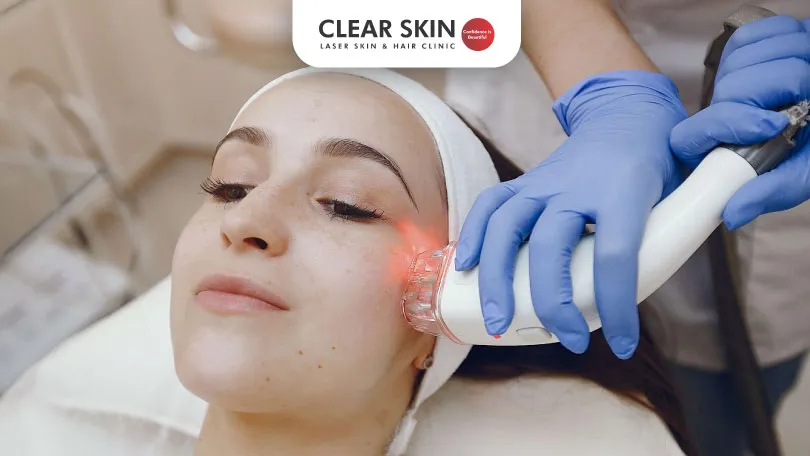
Does Laser Work on Scars?
Explore effective laser scar treatments like PRP, microneedling, and CO2 laser at Clearskin Clinic Pune for smoother skin and improved texture.
Cost of Laser Hair Reduction
Explore the benefits, cost factors, and advanced technologies in laser hair reduction. Visit Clear Skin Clinic Pune for expert treatments and smoother skin.
Can you Control Oily Skin?
Find out if coffee causes acne & how it affects your skin. Talk to the experts at Clear Skin Clinic in Pune for personalized acne treatment.
Coffee and Acne: Uncovering the Truth Behind the Breakouts
Find out if coffee causes acne & how it affects your skin. Talk to the experts at Clear Skin Clinic in Pune for personalized acne treatment.
Conquering Stress Acne: Effective Strategies for Clearer Skin
The symptoms of stress acne, effective treatment options, and expert prevention tips from Clear Skin Clinic in Pune.
How to Get Rid of Pimples: Effective Hacks & Tips
Discover effective hacks and expert tips from Dr. Dhanraj Chavan to get rid of big pimples and achieve clear, glowing skin.
Blind Pimple Causes: 6 Key Reasons Explained
Discover the top 6 causes of blind pimples and how to treat them.
We Are Here To Answer Every Possible Doubt You Have On Melasma.
If you don’t find answer to your query, then please write down to is. We are always there to help you.
What is melasma pigmentation?
Melasma is a form of pigmentation caused by the overproduction of melanin in the skin. It appears as freckle spots and blotches in darker pigments and is commonly known as butterfly Rash, chloasma faciei or mask of pregnancy. Appearance of melasma – Face – Cheek – Nose – Bridge of the nose – Forehead – Upper Lip – Rarely over shoulders and neck
Who can get melasma?
Anyone who has a hereditary or hormonal predominance of pigmentation can get melasma. It can also occur due to Sun exposure without protective clothing and weather changes. Melasma is more common in females. Only 10% of male patients get melasma. Triggering factors for Melasma – Sunlight – Hormonal changes – Few cosmetic irritant products – Oral contraceptive pills Melasma treatments – Use sunscreen regularly with SPF30 or higher. Apply it 15 minutes before stepping out. Repeat the application every 3 hours, even when at home. – Local application of various creams like hydroquinone group, tretinoin group other depigmenting creams & oral medications – Chemical peel – Microdermabrasion – Skin Polishing – Fractional Q switch ND-Yag laser (Q switch laser)
What is the best treatment for melasma?
Melasma is a chronic form of pigmentation in the skin that appears as spots or blotches. It can start in the early 20s and last up to your 40s. Usually seen in more women than men, it can make the skin sensitive to the Sun due to the overproduction of melanin by the pigment cells(melanocytes) during sun exposure. Melasma on the skin can be of the following types: Epidermal melasma has a well-defined border & it is in dark brown color. This melasma responds very good to the line of treatment. Dermal Melasma, is located in the dermis of skin & has faded borders. This pigment is light brown or bluish in color. Being deeply seated, it responds poorly to the treatment. Mixed Melasma, the most commonly found as Light brown, dark brown, bluish pigmentation on the skin. This improves partially with the treatment. Melasma can also be triggered due to various reasons including pregnancy in women, overexposure to the Sun without adequate protection, consumption of oral contraceptives, thyroid, etc. In order to treat melasma, consult a board-certified dermatologist to recognize the exact cause and procedure for the same. Your dermatologist can suggest topical creams to improve the skin’s texture. Skin treatments containing Vitamin C, arbutin, kojic acid, azelaic acid and niacinamide will also help treat pigmentation. Additionally, you need to apply sunscreen with SPF 30 or higher as well as PA+++ rating (PF indicates protection from UVB rays while PA implies protection from UVA rays) to fight free radicals in the skin. In any case, the treatment of Melasma is individualized. Every patient of melasma needs to be treated differently depending upon a level of pigment & type of skin. Multiple treatment modalities should be used to get the best outcome rather than monotherapy.
How to cure melasma permanently?
Melasma is a common skin condition that occurs mostly in women, especially during pregnancy. It appears as coloured spots or blotches on the skin and occurs due to the overproduction of melanin. It can also be caused due to sun exposure, climate changes and could also be hereditary in a few people. It can be seen as freckle-like spots on the face. However, there are various treatments that can help treat and bring melasma under control, – Chemical peels on the surface or in-depth layers of the skin that help to exfoliate dead cells, hydrate the skin, and give a rejuvenized look. – Laser treatments that reduce the excess melanin production and help to counter pigmentation in the skin – Trichloroacetic acid treatments – This treatment is most common in treating melasma. This treatment can give the best results. – Some oral and topical medications can help ease the texture of pigmented skin – It is necessary that those suffering from Melasma apply sunscreen frequently and avoid sun exposure as much as possible. Sunscreen must be applied even while at home. Always consult a dermatologist before trying out any of these treatment procedures as he or she can recommend the best remedy for your skin type. With constant checkups and treatment for your skin, you can get the best results in about 4-6 months.
Is chemical peel effective for melasma?
Melasma is a result of pigmentation on the skin, caused by the overproduction of melanin by the pigment cells of the skin called melanocytes. It is a chronic skin condition that results in symmetrical, brownish, blotchy face pigmentation. Thankfully, there are various treatments and therapies that work to cure the skin condition. The most popular form of treatment for melasma is the use of chemical peels. Usually, a chemical peel costs between Rs. 2000 to Rs. 5000 through a good clinic. Some dermatologists might also require a combination of chemical peels, depending upon the intensity of melasma on your skin. You should consult a dermatologist near you and get a skin analysis conducted to figure out the exact treatment for melasma. Ensure that you only visit a board-certified dermatologist who can diagnose a proper treatment for you without any discomfort to your skin.
How long does it take for melasma to fade?
Melasma is a result of skin pigmentation, which can be caused due to many different reasons. For some, it’s hormonal or due to overexposure to the Sun. For others, it can be genetic. Many women also face melasma during and after pregnancy. Despite the reason for its occurrence, it needs to be brought under control through various types of treatment methods including laser treatments, chemical peels, along with topical applications and oral medications. This skin condition takes almost 4-6 months to fade but may differ from person to person. Around 60% of patients get promising results from the first day of treatment. 20% take a gradual pace in showing improvements whereas the remaining 20% don’t show any improvements at all. It takes about 5 to 6 sessions of treatment to determine whether the melasma condition is responding to the treatment. With continuous treatment, medicines, and care for your skin as recommended by your dermatologist, you can treat melasma effectively.
Is melasma contagious?
No, melasma is not contagious. It cannot be spread from person to person.
